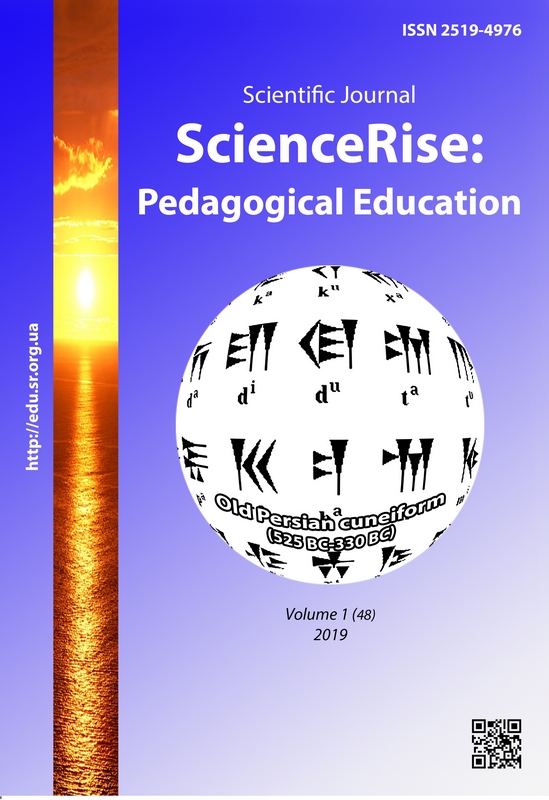The phenomenon of the self-efficacy of the modern teacher in the light of the synergy theory
DOI:
https://doi.org/10.15587/2519-4984.2019.154575Keywords:
self-efficacy, synergetics, professional-personal self-perfection, self-development, pedagogical self-efficacy, critical thinkingAbstract
The article focuses on the importance of reorienting own professional activities of the teacher in the direction of the priority of mechanisms of self-realization, self-development, self-regulation, necessary for his/her professional and personal self-improvement. The importance of the development of the phenomenon of self-efficacy of the teacher as the basis for the disclosure of his/her own potential, aimed at a spiritual activity and obtaining an effective result in professional activity, as well as an important tool for the modernization of the domestic educational space, is emphasized. The essence of the concepts of "self-efficacy", "pedagogical self-efficacy" is singled out and analyzed. Thus, it is noted that self-efficacy should be characterized by such features as reflexivity and awareness; effectiveness and focus on success; manageability and sequence; ability to self-assess; mobility, flexibility and predictability, etc. The mechanism of development of self-efficacy of a teacher is considered from positions of the synergetic approach, taking into account the main principles of the synergetic paradigm in education. The attention is focused on the possibilities of synergy for the teaching science in the aspect of consideration of open systems (teacher, teaching staff, the pedagogical system in general), capable of self-organization. It is stated that any teacher in synergy can find the semantic keys for building own trajectory of self-efficacy development management. The teacher should be considered as a productive entity of his/her own professional activities. The essential features of a self-efficient teacher as a synergetic system are described. It is concluded that the most effective teacher in the theory of synergy appears as an active subject of professional activity and agent of changes in the course of the reformation of an educational institution, and expediency of development of the following signs and properties is proved, such as: positive perception of reality; acceptance of oneself, others and the surrounding world in general as they are and what they can be in the future; the ability to set goals, to overcome professional and life difficulties with the installation of self-change; manifestation of existential spontaneity, directness in solving pedagogical problems; confidence in their own professional and spiritual potential as an internal resource of self-development and self-motivation; the ability to really and adequately assess oneself, the vision of both their own positive qualities and disadvantages, etc.
References
- Kremen, V. H. (Ed.) (2014). Synerhetyka i osvita. Kyiv: Instytut obdarovanoi dytyny, 348.
- Bandura, A. (2001). Social Cognitive Theory: An Agentic Perspective. Annual Review of Psychology, 52 (1), 1–26. doi: http://doi.org/10.1146/annurev.psych.52.1.1
- Mayer, J. D., Salovey, P. (1993). The intelligence of emotional intelligence. Intelligence, 17 (4), 433–442. doi: http://doi.org/10.1016/0160-2896(93)90010-3
- Vasil'eva, T. I. (2008). Dinamika professional'noy samoeffektivnosti budushhego pedagoga-psikhologa. Moscow, 25.
- Kremeshna, T. I. (2008). Formuvannia profesiinoi samoefektyvnosti maibutnikh uchyteliv muzyky. Odessa, 23.
- Fast, O. L. (2009). Psykholoho-pedahohichnyi aspekt formuvannia profesiinoi samoefektyvnosti maibutnikh uchyteliv. Naukovi zapysky Vinnytskoho derzhavnoho pedahohichnoho universytetu imeni Mykhaila Kotsiubynskoho. Seriia: Pedahohika i psykholohiia, 27, 445–448.
- Mushehov, O. M. (2016). Osoblyvosti samoefektyvnosti pedahohichnykh pratsivnykiv ZNZ. Orhanizatsiina psykholohiia. Ekonomichna psykholohiia, 2-3 (5-6), 97–103.
- Tkachenko, L. I. (2013). Synerhetychnyi pidkhid u pedahohitsi: nova paradyhma. Osvita ta rozvytok obdarovanoi osobystosti, 10 (17), 18–21.
- Knyazeva, E. N., Kurdyumov, S. P. (2002). Osnovaniya sinergetiki. Rezhimy s obostreniem, samoorganizatsiya, tempomiry. Saint Petersburg: Alteya, 414.
- Rubel, O. (2006). Synerhetyka yak innovatsiina metodolohiia pedahohichnoi osvity. Filosofiia osvity, 1 (3), 35–41.
- Budanov, V. (2006). Metodolohyia i pryntsypi synerhetyky. Filosofiia osvity, 1 (3), 143–172.
- Makarova, L. N. (2000). Prepodavatel' vysshey shkoly: individual'nost', stil', deyatel'nost'. P. 2. Moscow: MGLU, 142.
- Kremen, V. H. (2013). Pedahohichna synerhetyka: poniatiino-katehorialnyi syntez. Teoriia i praktyka upravlinnia sotsialnymy systemamy, 3, 3–19.
Downloads
Published
How to Cite
Issue
Section
License
Copyright (c) 2019 Irina Makarenko

This work is licensed under a Creative Commons Attribution 4.0 International License.
Our journal abides by the Creative Commons CC BY copyright rights and permissions for open access journals.
Authors, who are published in this journal, agree to the following conditions:
1. The authors reserve the right to authorship of the work and pass the first publication right of this work to the journal under the terms of a Creative Commons CC BY, which allows others to freely distribute the published research with the obligatory reference to the authors of the original work and the first publication of the work in this journal.
2. The authors have the right to conclude separate supplement agreements that relate to non-exclusive work distribution in the form in which it has been published by the journal (for example, to upload the work to the online storage of the journal or publish it as part of a monograph), provided that the reference to the first publication of the work in this journal is included.







